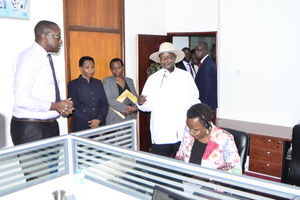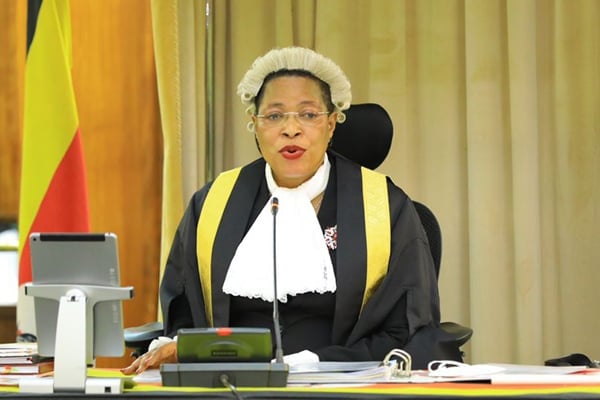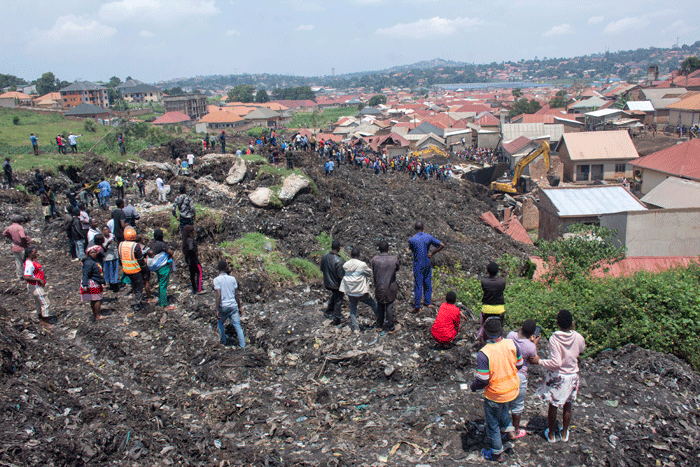
Students from different universities march to Parliament on Nasser Road on July 23, 2024. PHOTO/MICHAEL KAKUMIRIZI
Youthful Ugandans on July 23 stormed the city in an anti-corruption march to Parliament to voice their frustrations at the vice, which they said is running out of control.
The youth said the current NRM government, now in power for four decades, can no longer be trusted to fight the extensive corruption in its government ministries, departments and agencies.
Focus on Parliament
There has been intense scrutiny of Parliament, including an exhibition under the hashtag #UgandaParliamentExhibition on the micro-blogging site X, formerly Twitter, amid criticism over alleged maladministration and extravagant spending by the 11th Parliament.
The drive was led by citizens, among them journalist cum lawyer and social justice activist Agatha Atuhaire, and university don and satirist, Prof Jimmy Spire Ssentongo. But Speaker Among has often dismissed it as a political witch-hunt.
Losses to corruption
A 2021 report by the Inspectorate General of Government (IGG) says Uganda loses up to Shs9.1 trillion to corruption annually. The same report says the figures could be higher, except some of the areas investigated did not have data to quantify the costs.
The data indicates that nearly Shs4.5 trillion per year is corruption cost borne by the public budget while another Shs4.3 trillion per year is lost to corruption by public service users, citizens, and companies.
These losses mostly in the health and education sectors mean many health facilities go without the essential medicines and health workers are poorly remunerated, forcing them to sell government drugs or ask for bribes.
Ms Mary Mugarura, a resident of Namwongo, a Kampala City suburb, said the rampant corruption has largely failed service delivery in Uganda. She said many people are dying in health facilities because they cannot get adequate medical care.
“Look at what is happening in our health facilities and other government offices. Our mothers and babies are dying in the poorly facilitated health facilities when the corrupt take their loved ones to the best hospitals abroad,” she said.
A 2023 data from the Ministry of Health indicate that at least 189 mothers out of 100,000 die either during childbearing or before reaching 42 days after. Many of the deaths are attributed to inadequate facilities to handle the emergencies.
In the education sector, children are forced to learn under trees and dilapidated structures.
The report says the environmental protection sector took the highest total cost of corruption estimated at about Shs2.8 trillion per year, closely followed by absenteeism in the public sector amounting to about Shs2.3 trillion per year.
The IGG report says the money lost through corruption represented 44 percent of total government revenue in 2019. “In other words, corruption cost each Ugandan at least Shs200,000 in 2019. These figures include both direct and indirect costs of corruption,” the report says.
Many Ugandans across the country are crying because of poor service delivery as a result of corruption. Even Inspector General of Government Beti Olive Kamya, in her pervious statement said the vice is eating into Uganda’s service delivery and asked the citizens to rise up and fight the vice.
“None of us [top government officials] is going to die in Mulago hospital because there’s no medicine. I’m telling you the truth. If there’s no medicine, he will call the president who will put him on a plane to America. He and I are not the victims of corruption. You must know who the victim is and start fighting as victims. You’ll die in Mulago hospital because you have no option of going to Nairobi. We [senior government officials] are driving VXs and don’t even feel the potholes. You [ordinary Ugandans] are the ones feeling the potholes because UNRA mismanaged the funds...” she said.
A leaked report published by Daily Monitor on March 26, 2022, from a ministerial retreat last December, convened to assess the government’s performance in the previous year, revealed that every year government spends at least $150 million (about Shs377 billion) on treatment of mostly top government officials abroad.
This expenditure, medical practitioners who have set up private medical facilities in the country, say could construct up to 10 modern hospitals.
We were unable to get response from the IGG yesterday on the move by the youth to take matters into their own hands to fight corruption. Our repeated phone calls to her went unanswered.
During a twitter space yesterday morning, many of the youth, who participated voiced their frustration at the government inaction to fighting the vice.
James Opio shortly after the meeting told this publication that they have had enough of government’s inaction and now was their time to take matters into their own hands.
“Have you seen schools in the rural areas? What about health facilities? These people budget and eat the money here while we are dying with our poor parents in the villages. This corruption must end because we can’t afford to lose any more people because health centres have no medicines,” he said.
“Tell my wife and my children that if I die today, I am dying for them so that they can have a better tomorrow. They have suffered enough as a result of corruption, so we must act,” he said as he headed to Kampala city centre to join the protests.
Mr Allan Arinatwe, who said he was coming from Western Uganda, said after struggling for years to pay his own school fees, he was asked to pay money to obtain a government job.
“Why should I pay to get government job? This must end because many of our people have suffered. My mother died at hospital because we could not afford to pay for the bills. I am unemployed and yet I have to look after my siblings. This corruption has affected us so much and we must end it,” he said.
Dr Chris Baryomonsi, the minister of ICT and National Guidance, who is also the government spokesperson, could not be reached for a comment on how effectively government has responded to the youth protests in Kampala.
Mr Marlon Agaba, the Executive Director of Anti-Corruption Coalition Uganda, yesterday said this corruption has affected the quality of service delivery, especially in critical sectors such as health, education, livelihoods and infrastructure, which he said is evidenced by lack of essential medicines in hospitals, dilapidated equipment and infrastructure, absenteeism and charging of illegal user fees.
“In education, corruption makes the cost of acquiring quality education high, contributes to the dilapidated structures and leads to poor quality outputs like we have seen with UPE,” he said.
Mr Agaba also said Ugandans are yawning because corruption has led to denial of rights which are enshrined in the constitution like the right to health, education, and clean environment.
For instance, he said on the issue of environment, corruption has led to encroachment on forests, wetlands and other protected areas, whose effects he said are quite astronomical, including flooding, changing weather patterns, and drought.
“For every shilling stolen, there is a victim. In essence, corruption sometimes kills. For instance, the 16 mothers dying daily due to preventable conditions, the half-baked UPE products roaming the streets, violent crime due to lack of fair opportunities, road fatalities due to shoddy work,” he added.
A concerned citizen, who only identified himself Stanley, said the problem of corruption in Uganda is much bigger than can be talked about. While corruption has eaten deep into the coffers of the country, the same institutions charged with fighting corruption are also corrupt. He asked the government to consolidate them into a single and strong institution to handle all corruption issues.
“My disappointment is that most authorities responsible for intervention are equally corrupt. I think the problem might be the involvement of many agencies in fighting the single vice, which is corruption,” he said.
Cost of Corruption in Uganda
Affected | Sector | Cost description | Form | Cost Estimate |
Citizens | Taxation | Bribing tax official | Financial | Shs26.8 billion |
Public budget | Taxation | Tax evasion (citizens) | Financial | Shs1.7Billion |
Public budget | Taxation | Tax evasion (firms) | Financial | Shs107.2 Billion |
Public budget | User fees | Loss of fees for public utilities | Financial | Shs424.5 Billion |
Citizens | User fees | Cost of bribing official | Financial | Shs53.7 Billion |
Society | Natural resource | Environmental degradation | In-kind | non-measurable |
Citizens | Natural resource | Corruption in contract (citizens) | Financial | Shs859.2 Billion |
Citizens | Natural resource | Corruption in contract (firms) | Financial | Shs8.8 Billion |
Public budget | Service provision | Salary payin absence (educ & health) | Financial | Shs2.3 Trillion |
Citizens | Education | Bribing teacher/examiner | Financial | Shs39.1 Billion |
Citizens | Education | Cost of wellbeing of students | In-kind | non-measurable |
Citizens | Education | Loss of education quality for user | In-kind | non-measurable |
Public budget | Education | Loss of public education funds | Financial | Shs244.6B |
Citizens | Healthcare | Cost of bribing healthcare provider | Financial | Shs140.8 Billion |
Citizens | Healthcare | Loss of treatment due to big bribe | In-kind | Shs33.4 Billion |
Citizens | Healthcare | Loss of healthcare over absenteeism | In-kind | In absenteeism |
Citizens | Security | Cost of bribing security official | Financial | Shs90.9 Billion |
Citizens | Security | Cost to budget for non-paid fines | Financial | non-measurable |
Citizens | Security | Loss of security to citizen | In-kind | non-measurable |
Citizens | Security | Non-delivered security services | Financial | non-measurable |
Citizens | Security | Loss of public security funds | Financial | non-measurable |
Public budget | Environment | Loss of environmental resources | In-kind | Shs2.3 Trillion |
Public budget | Environment | Loss of public environment funds | Financial | non-measurable |
Citizens | Environment | Environmental pollution/degradation | In-kind | Shs536.8 Billion |
Public budget | Permits | Loss of revenue from permit fees | Financial | Shs14.2 Billion |
Citizens | Permits | Cost of bribing to receive permit | Financial | Shs243.7 Billion |
Society | Permits | Unlawful provision of land rights etc | In-kind | non-measurable |
Public budget | Procurement | Corruption in procurement | Financial | Shs614.4 Billion |
Citizens | Procurement | Low-quality delivery of goods | In-kind | non-measurable |
Public budget | Procurement | Distorted spending structure | Financial | non-measurable |
Public budget | Budget | Loss of public budget | Financial | non-measurable |
Society | FDI | Loss of foreign productive investment | Financial | Shs18.5 Billion |
Society | Interest rates | High interest rates on credit markets | Financial | non-measurable |
Society | Labour market | Loss due to inefficient workforce | Financial | Shs320.5 Billion |
Society | Trust in institutions | Distrust in public institutions | In-kind | non-measurable |
Society | Rule of law | Loss of trust in rule of law | In-kind | non-measurable |
Citizens | Rule of law | Cost of bribing judges | Financial | Shs762.9 Billion |
Sum total | Shs9.1 Trillion |
Source: IGG Cost of Corruption Report 2021








